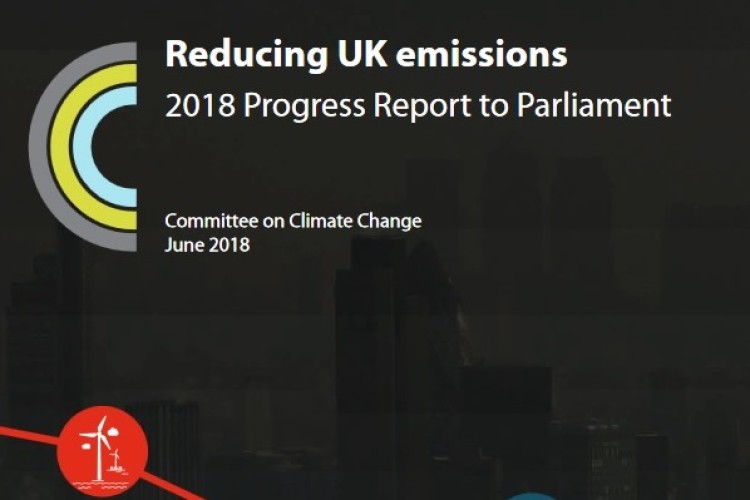For example, home insulation installation rates are now at their lowest in 10 years and are at just 5% of peak market delivery in 2012.
The Committee on Climate Change’s 2018 progress report to parliament shows that, overall, UK emissions are down 43% compared to the 1990 baseline while the economy has grown significantly over the same period. However, most of this is down to excellent progress in reducing emissions from electricity generation, while reductions in other sectors have stalled, it says.
“Since 2008, the UK has seen a rapid reduction in emissions in the electricity sector, but this achievement masks a marked failure to decarbonise other sectors, including transport, agriculture and buildings,” the committee said. “In the last five years, emissions reductions in these areas have stalled. As a result, the UK is not on course to meet the fourth (2023-2027) or fifth (2028-2032) carbon budgets. Nor will it be on course unless risks to the delivery of existing policies are reduced significantly and until government brings forward effective new policies to deliver commitments beyond the achievements in electricity generation and waste.”
Its report says: “The necessary progress is not being made in improving energy efficiency – home insulation rates are at just 5% of peak market delivery in 2012. Nor is the necessary progress being made in shifting to low-carbon heating. Insulation installation rates are now at their lowest in 10 years, including for loft insulation, despite considerable remaining potential, and even though this is a highly cost-effective measure.”
Direct emissions from buildings fell in 2017 to 85MtCO2e, a 4% reduction relative to
2016. This was entirely due to higher winter temperatures; adjusting for this, annual emissions in 2017 rose by around 1% relative to the previous year. This is the second successive year that temperature-adjusted emissions have increased.
Home insulation rates fell further in 2017, with only 123,000 lofts or walls being insulated.
Opportunities for cost-effective carbon and bill savings are being missed, the report says. For a typical home, the absence of loft insulation adds in the region of £105 a year to bills. The absence of cavity wall insulation adds around £115 a year to bills.

The report says: “Energy efficiency must urgently be improved across the building stock. Current policy is failing to drive uptake, including for highly cost-effective measures such as loft insulation. Policy needs to incentivise efficient long-term investments, rather than piecemeal incremental change. Backstop mandatory requirements can support this, as in Scotland, creating policy certainty and driving innovation and growth. The shift to focusing on operational savings must be accelerated – and public reporting mechanisms remain vital tools for benchmarking public and commercial buildings.”
Chopping and changing government policies have not helped, it says. “A number of important programmes have been cancelled in recent years at short notice, including Zero Carbon Homes and the Carbon Capture and Storage (CCS) Commercialisation Programme. This has led to uncertainty, which carries a real cost. A consistent policy environment keeps investor risk low, reduces the cost of capital, provides clear signals to the consumer and gives businesses the confidence to build UK-based supply chains.”
The Committee on Climate Change also calls for more low-carbon heat (e.g. heat pumps and low-carbon district heating schemes). “Cost-effective and low-regret opportunities exist for heat pumps to be installed in homes and businesses that are off the gas grid, together with low-carbon heat networks in heat-dense areas (e.g. cities) and for increased volumes of biomethane injection into the gas grid (up to around 5% of gas demand). There remain important questions to be resolved around the current balance of tax and regulatory costs across fuels, which currently weaken the private economic case for electrification.”
It says that progress is harder to track in public and commercial buildings, due to the huge variation in building type and lack of consistent datasets covering all buildings. However, overall measures of energy intensity show no evidence of underlying progress. Energy intensity remained broadly unchanged in 2016, the latest year for which there are available data, with slight increases in both public energy consumption per unit of output (real GVA) and commercial energy consumption per m2.
CCC chairman Lord Deben (formerly agriculture minister John Selwyn Gummer) said: “Although the UK seeks to lead the world in tackling climate change, the fact is that we’re off track to meet our own emissions targets in the 2020s and 2030s. We welcomed the government’s commitment in the Clean Growth Strategy to put green growth at the heart of its economic policy. We recognise that over the last ten years, the government has shown it has the know-how and commitment to drive down UK emissions in the electricity sector by acting early and consistently to avoid costly interventions later. We now have to ensure that the government learns from this experience and presents a programme to tackle emissions right across the economy, including in buildings, transport and agriculture. This action is now urgent in order to meet the UK’s legally-binding climate change targets, and to prepare to fulfil the obligations of the Paris Agreement.”
Gareth Redmond-King, head of climate and energy at the Worldwide Fund for Nature, commented: “Historically, the UK has shown we can lead the world in green growth, but progress has stalled. Right now, the UK government is committing to expand Heathrow – the country’s biggest carbon polluter – while leaving the cheapest renewables frozen out. If we are to begin restoring nature it’s vital the government leads the world towards a zero-carbon economy by accelerating the phase out of petrol and diesel cars, unlocking investment in renewables and energy efficiency, and ending public subsidy for dirty fossil fuels.”
Got a story? Email news@theconstructionindex.co.uk



